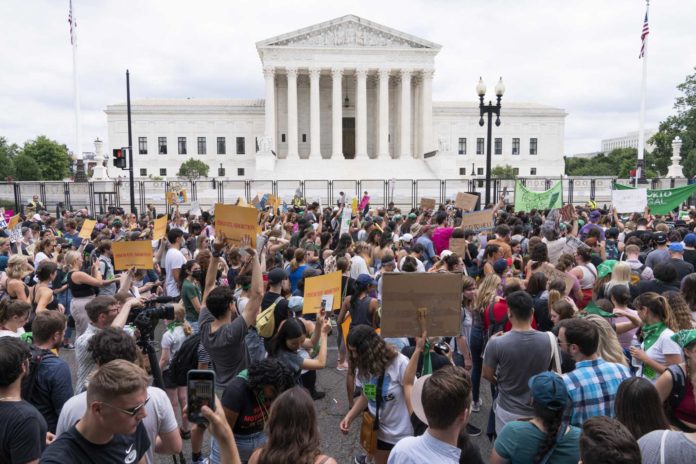
What personal rights, such as the right to abortion, are protected by the Fourteenth Amendment’s guarantees of liberty and equality? According to the Supreme Court, only those rights that are “deeply rooted in the nation’s history and traditions” dating back to 1868, when the amendment was ratified and few states allowed abortion — and when women were denied the right to vote and most other rights.
What restrictions can states impose on the right to carry a gun? According to the court, only those the government can prove to be “part of the historical tradition” that limited those rights — with a particular focus on the late 19th century, when the Second Amendment took effect and when the law required all males 18 and older to carry muskets and join their state militia.
The lesson from the final days of the court’s 2021-22 term, apparently, is that constitutional rights should be determined in the history books, as interpreted by a five-justice conservative majority.
The Fourteenth Amendment, one of three enacted after the Civil War, is worded broadly to prohibit states from depriving anyone of “life, liberty, or property, without due process of law,” or denying anyone “the equal protection of the laws.” In the past, said Cory Franklin, a UCLA law professor, the court has defined “liberty” to include “the kinds of rights that were meant to be protected,” a definition that eventually covered abortion and same-sex marriage.
But now, she said, the court “has rejected that test, and asks whether the right specifically has a long history of being protected,” a test that many contested rights cannot pass.
The process is ideologically selective, said Erwin Chemerinsky, the law school dean at UC Berkeley and a liberal legal scholar.
“They look at history, but only the history that supports their position,” he said. “They ignore the half century of history protecting abortion rights (since the 1973 Roe v. Wade decision that the court overruled). They ignore the New York law (limiting concealed carrying of firearms) more than a century old and all the regulation of concealed weapons.”
But UCLA Law Professor Eugene Volokh, a libertarian scholar, said the court is simply interpreting the Constitution according to its original meaning.
The current majority would say that “we follow the Constitution as written because it’s the law, and part of following the Constitution is following it as understood at the time it was written, rather than as updated by justices’ views of what it should be,” Volokh said. “When there’s need to change it, there can be a constitutional amendment.”
Other conservative jurists have also included history lessons in recent constitutional rulings. In a 2-1 decision May 11 striking down California’s ban on sales of semiautomatic rifles to anyone under 21, Judge Ryan Nelson cited the late 19th century edict of militia membership for 18-year-olds and said, “America would not exist without the heroism of the young adults who fought and died in our revolutionary army.”
That decision could be overturned by the full appeals court, which has a majority of Democratic appointees. But the Supreme Court may have the last word, in light of its 6-3 ruling Thursday that struck down New York’s restrictions on concealed carrying of guns and will invalidate similar laws in five other states, including California.
In that ruling, Justice Clarence Thomas, a self-described “originalist” — one who interprets the Constitution as he perceives the original drafters intended, regardless of broader modern-era interpretations — said previous decisions on firearms had wrongly considered such factors as whether a law would place a modest or severe burden on gun owners and sellers.
Under a proper view of the Second Amendment right to keep and bear arms, Thomas said, any restriction is unconstitutional unless the government can prove it is “consistent with this nation’s historical tradition of firearms regulation.” And because states at the nation’s founding allowed ordinary citizens to carry firearms in public, he said, a state may not prevent them from doing so now — despite recent waves of mass shootings, which Thomas found irrelevant to the legal issues.
Similarly, Justice Samuel Alito, in Friday’s abortion ruling, said, “the Constitution makes no reference to abortion” and the procedure was not part of the nation’s “history and tradition.” The history he referred to was not the 49-plus years since Roe v. Wade but 105 years earlier, when abortion was uncommon and often unsafe and women had no voice in the political process. He also cited English cases dating back to the 13th century that condemned abortion as murder.
Although Alito insisted that the ruling did not threaten other rights the court has recognized under liberty guarantees of the Fourteenth Amendment, such as contraception and same-sex marriage, the court’s three dissenting justices said that under the court’s logic, “all rights that have no history stretching back to the mid-19th century are insecure.” And Thomas, who joined Alito’s opinion, said in a separate opinion that he would vote to overturn the gay-rights and contraception rulings.
“It’s a doubling-down on originalism,” said Alison Gash, an associate professor of political science at the University of Oregon. “When you read the decisions together, if (an individual right) isn’t written explicitly in the Constitution, like their reading of guns, then it ought to be up to state legislative determinations.”
“Relying on 19th-century laws, how is that taking into account gender inequality that was pervasive at that time?” asked Stanford Law professor Bernadette Meyler. “I don’t know how (the court’s) Second Amendment inquiry will apply to new types of weapons. And do you want states to be combing through the archives of 19th century statutes” to decide which laws they can pass?
Maybe so, at least for a right like gun possession that is expressly stated in a constitutional amendment, said Jason Whitehead, a political science professor at Cal State Long Beach. On such issues, he said, “the court inquires into the original public meaning of the words at the time they were written or ratified to determine the meaning of that text.”
But Whitehead said such inquiries are ill-suited, and can easily be exploited, on issues like abortion rights that are not part of the constitutional text and have instead been interpreted for decades as part of the Fourteenth Amendment’s guarantee of liberty.
“The court is free to roam at will among any number of historical books and articles to determine for itself whether ‘the nation’ has a ‘tradition’ or a ‘history’ of protecting a particular ‘right,’” he said. “Who knows what those questions even mean? How far back should we go?
“The majority on the court have apparently accepted the preposterous idea that any practice that was historically illegal is ipso facto not a fundamental right. That gives them a huge weapon against gay rights, artificial contraception, interracial marriage, etc.”
Bob Egelko is a San Francisco Chronicle staff writer. Email: begelko@sfchronicle.com Twitter: @BobEgelko









